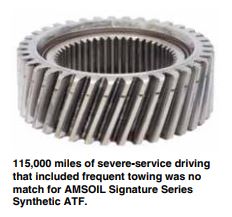Transmission maintenance requires a shift in thinking
Like motor oil, transmission fluid must now do more.
Matt Erickson | TECHNICAL MANAGER – PCLT PRODUCTS AND MECHANICAL R&D
What’s more important to your vehicle, the engine or transmission?
It’s a trick question; they’re equally important. You’re not going anywhere without either one. But which do people think more about? I suspect most casual motorists never spend an ounce of energy thinking about their transmission until it begins to shift erratically or slip. Then, when they’re staring at a $4,000 repair bill, you can bet their transmission is top-of-mind.
An ounce of prevention
The good news is, you can avoid most transmission problems with a little preventive maintenance. Not only is periodically changing transmission fluid far easier and less expensive than an overhaul, it’s vital to maximizing the life of today’s vehicles.
Just like modern cars and trucks are tougher on oil, they’re tougher on transmission fluid for largely the same reasons. For starters, vehicles make more power today than ever before. The automakers are in a seemingly endless arms race to produce more power than the competition. All that added power has to go through the transmission before reaching the wheels, yet modern transmissions are smaller and lighter than their predecessors. They also now use lower-viscosity fluids to help boost fuel efficiency. That translates into thinner fluid protecting against intense heat and wear inside a transmission that handles more power – not an easy task.
Cleanliness, too, is important. Heat is one of the transmission fluid’s biggest enemies. It speeds the oxidation process and causes the fluid to chemically break down. Fluid that has broken down can cause sludge and varnish to form, which clogs narrow oil passages and can lead to stuck valves. Soon, your vehicle can begin to shift hard, hesitate or quit shifting altogether.
Although they’re designed to be “filled for life,” that typically just means “fill for the life of the warranty.”
Longer drain intervals
Did I mention that drain intervals are also growing longer? A 2017 Ford* F-150, for example, calls for 150,000- mile transmission fluid service intervals in normal service. Of course, most drivers’ operating conditions fall under the severe service designation. Face it – you don’t buy a pickup truck to cruise the main drag; you buy it to tow and haul.
In this case, changing your transmission fluid is even more important, and Ford knows it since it reduces the drain interval to 30,000 miles. Towing and hauling generate intense heat, while the increased pressures can rupture the fluid film, allowing metal-to-metal contact and wear.
We wanted to prove the performance of AMSOIL Signature Series Fuel-Efficient Synthetic Automatic Transmission Fluid in just this scenario, so we submitted it for a field trial at an independent test facility. A loaded trailer was routinely towed on real highways and city streets throughout the trial. Signature Series Synthetic ATF handled the punishment with ease. Throughout 115,000 miles in severe service – nearly 4X the manufacturer’s recommended severe service drain interval – Signature Series ATF delivered outstanding protection for gears (see image) and clutches and maintained smooth shifts.
Fill for life?
Overcoming inertia might be the biggest barrier to convincing someone to service his transmission. And the automakers aren’t helping with the proliferation of “fill-for-life” transmissions on the market that don’t even include a readily accessible dipstick to check the fluid. Although they’re designed to be “filled for life,” that typically just means “fill for the life of the warranty.” If it fails once the warranty has expired, what do you suppose the dealership is going to do for you? That’s right; hand you a hefty bill. It’s just as important to service these units and replace the fluid – which can be done – at least once to ensure the transmission lasts as designed and gives you years of solid performance beyond the manufacturer’s warranty period.
Motivating someone to maintain his transmission can be tough if it’s working fine and isn’t causing problems. But ask him, “Would you like to spend a couple hundred bucks today to keep it that way, or would you rather spend a couple thousand someday to fix it?”
Dealer’s note: Perhaps if the car doesn’t have a transmission fluid dip-stick, refuse to buy it?







